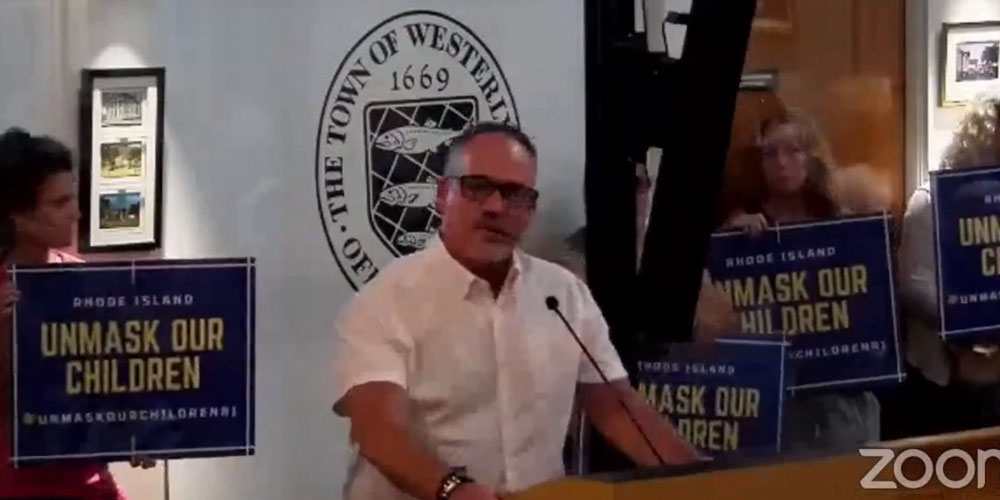
Demise of “Divisive Concept” Ban in Westerly Schools Outs Radical Activism
The Westerly, Rhode Island, School Committee refused to pass a resolution prohibiting the teaching of certain “divisive concepts” to students. Although the term “critical race theory (CRT)” is not mentioned in the resolution, advocates on both sides clearly associated the resolution with that hot-button topic of public rancor.
The resolution is similar in spirit to legislation across the country and an executive order by Republican President Donald Trump that Democrat President Joseph Biden withdrew on his first day. As has been the case with articles concerning legislation at the state General Assembly and elsewhere, news reports about the debate tend not to provide examples of what, exactly, would be banned under such resolutions. That may, perhaps, be because the ban isn’t — as opponents insist — against the teaching of history or that racism does and has existed, but rather against the teaching of racism. Here is the operative text:
Westerly Public Schools hereby prohibits the teaching of divisive concepts to any of its students, teachers, or other staff, employed in any of its schools or offices, including the following:
- One race or sex is superior to another race or sex,
- The Town of Westerly, The State of Rhode Island, and the United States of America, are fundamentally and systemically racist or sexist,
- An individual, by virtue of his/her race or sex, is inherently racist, sexist, or oppressive, whether consciously or subconsciously,
- An individual should be discriminated against or receive adverse treatment based solely or partly on his/her race or sex,
- An individual’s moral character is necessarily determined by his/her race or sex,
- An individual, by virtue of his/her race or sex, bears responsibility for actions committed in the past by other members of the same race or sex,
- Meritocracy, or traits such as hard work, work ethic, grit, and accountability are racist or sexist, or were created by a particular race to oppress another race,
- The success or failure of an individual is due to his/her race, and only to race.
In reference to the above, divisive concepts include any form of racial or sexual stereotyping, or any other form of racial or sexual scapegoating:
- Racial or sexual stereotyping means assigning character traits, values, moral, and ethical codes, privileges, status, or beliefs to a race or sex, or to an individual, because of his/her race or sex.
- Racial or sexual scapegoating means assigning fault, blame, or bias to a race or sex, or to members of a race or sex, because of one’s race or sex, and similarly encompasses any claim that any particular race or sex is responsible for the destiny, success, or failure of another race or sex.
According to Robert Chiaradio, the Westerly resident who produced the resolution and submitted it to the school committee, this isn’t model legislation provided to him by an activist organization. Rather, he started with the text of a bill that Republican state representative Patricia Morgan submitted this session of the General Assembly. Morgan says she crafted her legislation, which banned such “divisive concepts” for projects benefiting from state contracts or grants, based on various examples in other states, especially New Hampshire.
In Westerly, the school committee rejected the resolution unanimously, despite earlier expressions of support. Even Chiaradio’s sister, Chairwoman Diane Chiaradio Bowdy, voted against the resolution. Her brother attributes the result to coordinated activism by the school department, the local teachers union, and the Westerly Anti-Racism Coalition.
Speaking against the resolution, Westerly Teachers Association President Colleen Saila echoed state and national union talking points claiming that her union’s members “objectively present to students the good, the bad, and the ugly of our past.” National progressive organizations have produced talking-point guides for use in venues like the Westerly school committee meeting.
Morgan tells Anchor Rising that this has become a common strategy. During the hearing for her bill, she says, activists dominated the microphone with testimony that obscured the reality of her legislation. She highlights the fact that teachers in Barrington were found to have pressured students to testify against her bill, even offering extra credit.
By creating incentives for activism, providing manufactured materials, and ignoring the substance of legislation like that proposed by Chiaradio and Morgan, progressive advocates are providing cover for radicals to transform the teaching of civics and history into indoctrination into a divisive ideology that is tearing communities apart.
Featured image of Robert Chiaradio testifying in support of the resolution.


CRT places all people of color in to a grouping needing exclusive protections and accomodations to succeed – a gross insult to the millions who have achieved economic, social, political success on an equal playing field.
It would have those of caucasian birth seek self-depracation and guilt for cruelties and prejudices prior to their coming in to the world.
It would further erode a public school curriculum already dumbed down by Common Core and Standardized Testing by focusing History and Literature outside the bounds that unite us as Americans.